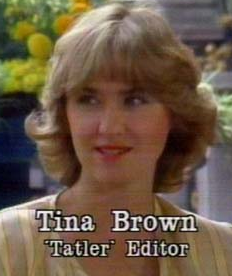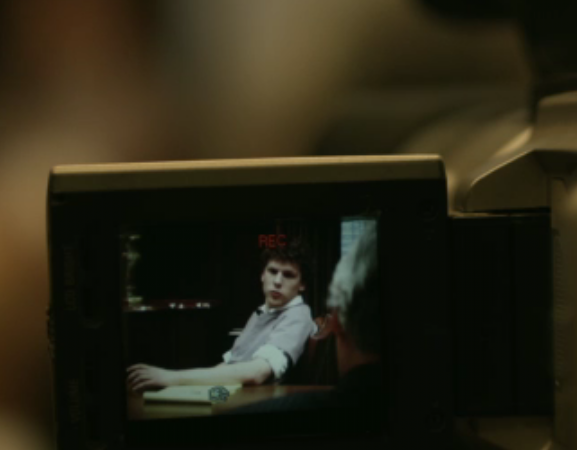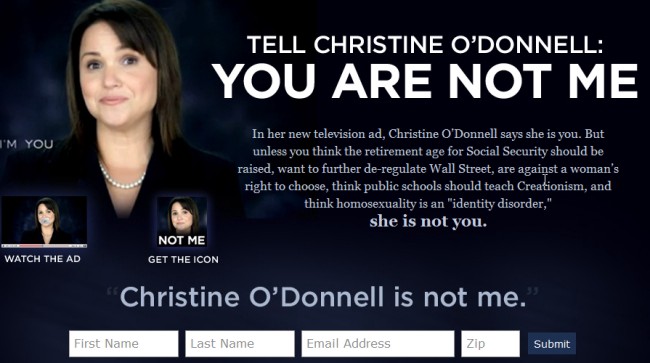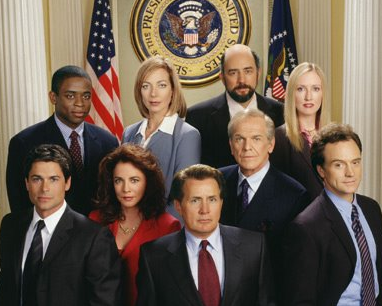Tina Brown, Two Years In, Declares Age of FUN, Serial Commas

The Daily Beast turns two years old today and its honcho interviews herself.
You have been accused of having your finger on the Zeitgeist. So where is it located right now? What do people want to read and consume?
Sexy brain food. Give us something to make us smarter, but for God’s sake don’t make it feel like work. People are in such a glum frame of mind they are looking for confidence, audacity, practicality, and FUN.
Very Recent History
“I graduated from Barnard in 2005, steeped in the era of ‘Sex and the City’s’ do-me feminism.”
Tribune CEO's Memo Says Today's 'New York Times' Story is All Lies

If you have not read the new David Carr piece on Tribune Company, I suggest you do, and I promise that even if you do not usually care about words like “newspapers” and “Chicago” and “bankruptcy” and “a collection of carnival workers,” you will still enjoy it mightily. And then you can come read the memo that Tribune’s Randy Michaels put out companywide last night in response. It follows, and it’s really ridiculous.
From: Tribune Communications
Sent: Tue Oct 05 20:09:33 2010
Subject: Message from Randy Michaels/Anticipated Column About Tribune
We have been informed that tomorrow’s New York Times will run a column written by David Carr (http://www.nightofthegun.com/#). Many of the questions Mr. Carr asked us for this article concerned events, distortions and rumors more than two years old. He will apparently paint the work environment at Tribune as hostile, sexist and otherwise inappropriate. Many of the rumors Mr. Carr referenced were spread by an ex-Chicago Tribune employee who is now a contributing writer to the New York Times. Mr. Carr has made clear that he is digging up these old allegations because he believes that decisions about the company’s management are about to be made, and he wants to influence those decisions. Mr. Carr knows that an outside firm investigated the most substantial of these allegations, and that they were found to be without substance. Mr. Carr intends to use them anyway.
As you know, it is our intention to create a fun, non-linear creative environment. I am tremendously proud of the results of that creative culture. Our websites on the P2P platform are the most advanced in media. We have reconfigured production of the newspaper with standard ad sizes, Media on Demand Modules, and combined editing, design, and layout functions using technology. We have “Breaking News Centers” that eliminate redundancy and give newsmakers one contact point for each market’s most powerful news media. TOPS, TONS, and BRUTUS have changed the way TV is produced and aired.
It is our intention to have creative environment. A creative culture must be built on a foundation of respect for each other. Our goal is an environment where people are free to speak up, free to challenge authority, and free to fail on the way to success. Our culture is NOT about being offensive or hurtful. This is supported by our Harassment Policy. It’s in the Employee Handbook which is posted on TribLink-Section 3.
The fact that so many at other media companies dwell on the way it used to be creates great opportunity for those of us willing to rethink our opportunities and recast our culture. Ignore the noise. Treat each other with respect. Have fun, and let’s go create the future.
Randy
My goodness. I don’t know, it’s like he’s never read a newspaper before.
In one small part, we’ll all agree with Randy Michaels-I also prefer to create workplaces where I am free to swear and be “creative”! (So does, oh right, almost anyone who’s ever worked at a newspaper.) And, yes: most modern workplaces are ridiculously uptight. On the other hand, some of us have boundaries and have never bit any of our employees on the neck, as was accused of Randy Michaels in one lawsuit in the 90s. Oh and also I didn’t help drain the life blood out of a corporation in the most spectacular, hideous way, leaving behind a series of newspapers that barely exist and should probably be stabbed to death. But God forbid Randy Michaels actually address the substance of the article.
Flicked Off: "The Social Network"
by Sasha Frere-Jones and Natasha Vargas-Cooper

Natasha Vargas-Cooper: I ain’t going to lie to you. I went in wanting to hate. I was queasy thinking about what Fincher/Sorkin had to say about the Digital Generation and I was resistant to suffering through Jesse’s flat-affect-acting.
Sasha Frere-Jones: I enjoyed the narrative locomotive, but the movie might as well have been about a struggle over the Enzongium contract in Quadrant K9. I would have liked that more, actually. This is first and foremost a movie about Sorkinese, a language that finds a comfy home in litigation. “The West Wing” was Walking and Talkingâ„¢-The Social Network is Sitting and Talking and Occasionally Dartingâ„¢.
NVC: What kills about Sorkinese is that it doesn’t give room for any mode but Pithy.
SFJ: In Sorkinland, people speak as if coked up (even when not) and are always witty and slightly angry.
NVC: The actors barely breathe between quips, except for the Eduardo Saverin character-he crowbarred in some moments of ACTING?
SFJ: He was good at perspiring and breathing.
NVC: It is no country for young men.
SFJ: Everyone is a quote machine in Sorkinland, even dumbos. Moving on: there are a lot of crazytown moves in the actual fabric of the story, and here is just one: almost every collaborative, commercial endeavor could engender a movie like this. Look at The Police. Band struggles over songwriting credits are an epic GOLD MINE.
NVC: YES! WHY ISNT THERE A POLICE MOVIE?! WORLD TOUR NETWORK.
SFJ: The core problem-which I think we agree on?-is that we did not see a movie about Facebook or the Internet. Think of that early moment when Zuck drops the “22,000” bomb. Rashida Jones has to pause and ponder the majesty of his pageviews. But wait-in 2003, there were many sites that could have quickly generated that kind of traffic. Hmm. That fact is not relevant, apparently. The movie’s plot driver and its ad tagline is another number: 500,000,000 users. OK-no argument. That is historically huge, no matter how anyone feels Zuckerberg fits into history, or what this movie does or doesn’t do. But what does the movie say about all those users? Almost zero, except a little bit about the first, university-based users.
SFJ: And we can probably salute the arc of the pitch. First, you were supposed to want to be on Facebook because only a small elite could join. Now, many stock options later, you need to get on Facebook because all of China and your Dad and your ex is on there. Nice! But is this a typical sales arc, selling exclusivity and then implying losership when it opens up and you’re not on it? Or atypical? You know more about products and pitches-what do you think?
NVC: This speaks to my overall beef to the movie: because the real DRAMA with Facebook that merited cinematic exploration is not questions about the creation myth of Zuck or the lawsuits with the Winklevi-but the decisions that came after the million members. The tradeoff between exclusivity and advertising money. I want to know about the decisions to open it up to public universities, to moms, to predators and (and/or) to advertisers.
SFJ: Enter John Seabrook’s 1993 piece on Bob Kearns, windshield wipers and the nature of patents, “The Flash of Genius.” (The article became the basis for a 2008 movie called “Flash of Genius”-cleaner without the article, isn’t it?-that jettisoned the most complicated bits of Seabrook’s piece and decided to celebrate the majesty of individual innovation.)
NVC: Goody!
SFJ: The piece seems relevant because it discusses how inventions can be ascribed to one person, and also how they can’t. Here is a passage about Thomas Jefferson, who took on the idea of inventions:
Jefferson thought he could fix the basic flaw in the British system. His solution was the principle of examination. The principle is that certain innovations have a quality that elevates them to the status of inventions, and thus makes them eligible to be held as private property, while innovations that lack this quality are the common property of humanity. Learned people can, by study and power of reason, determine which inventions deserve a patent and which do not. Examination is the greatest American contribution to the institution of patents, and it has been copied by virtually every industrial nation in the world. Like a lot of ideas associated with the Enlightenment, it sounds a lot better than it works.
SFJ: Patent law now favors the individual, and rewards him or her with the right to be paid. The idea of “common property of humanity” would sound like Communist pinko talk to most people now. So: did anyone ever cash in harder on “common property” than Zuckerberg? Aside from the very elegant design, which-kudos!
NVC: So why is this entirely forgettable procedural lawsuit movie being hailed as THE SECOND COMING?
SFJ: Nerd alert: I think it is about lexis and mimesis.
NVC: Explain yourself.
SFJ: Let’s compare “The West Wing” and “The Wire.”
NVC: I’d love to!
SFJ: Sorkin talk makes everybody feel smart and makes the shitty world look OK because making money and being an asshole is fine as long as a deserving nerd wins. This appeals to nerds and anybody who fancies themselves as SMARTS. Further, he goes in hard on lexis-the act of delivering words-and lets the characters walk you through everything that would either be the job of a) acting or b) the audience using their heads. It is a way to load middlebrow content into totally fun speed talk that saves many people some hard work while feeling highbrow, because only smart people can talk that quickly. It’s like associating athletic skill with height, de jure.
SFJ: Think of how many Sorkin characters are sort of Flat Erics who talk, rapidly describing every idea that could have been acted out. The advantage is you can cram a lot of action into one episode. The downside is a weird, Aspergersy sameness to every project. Actors become court stenographers in reverse, spitting out Sorkinese and then stepping aside to let the next block of text barrel through.
NVC: Agreed.
SFJ: “The Wire,” on the other hand, doesn’t mind alienating you. It eliminates spoken exposition (lexis) in favor of mimesis. This is an entire world, it is full, and you had better take notes if you want to keep up. You have to WORK. People who don’t look like you may be in charge for a minute, maybe for a long time, and nobody has the moral high ground.
NVC: THERE IS NO PRESIDENT BARTLET IN BALTIMORE.
SFJ: Sorkin loves the abasement that is a by-product of believing in the high ground. It’s in everything Sorkin does.
NVC: Might as well be footage of Sorkin sweatily wanking in front of a mirror screaming SAT words (with a hoodie on).
NVC: This brings us to the other big point which is about HISTORY. Here is the challenge thrown down regarding The Social Network: we are still in the middle of this moment; we are at the point where the lava is touching the sea. The lava is still hot!
NVC: David Fincher and Aaron Sorkin have the hubris (rightly or wrongly) to take it on and I think they did not rise to the occasion because it failed to actually be ABOUT anything but a lawsuit.
SFJ: Another flaw in the mimesis (which is part of the selling point, that this is A REAL NOW THING HAPPENING TO YOU) is that the movie didn’t summon any particular year. Compare that to the OCD set-design of “Mad Men” or the verité of Panic In Needle Park, which essentially time-stamp all their scenes.
NVC: Ooo, yes!
SFJ: It could have been 1972. It could have been 2012.
NVC: It could have been the dot com boom.
SFJ: Coke off an intern’s stomach in 2003? Wouldn’t it be Adderall?
SFJ: There is no take on this era. There is no take on the internet.
NVC: I think that’s a colossal failure of nerve.
SFJ: Like, I don’t think RoboCop says much about robots or cops. Though it does say something about cities.
NVC: This is still a movie about a lawsuit.
SFJ: The movie about the internet already exists and it’s called: The Matrix.
NVC: OH DOPE.
SFJ: But we can still value the Sosh Net. Look at that body of work about WWII.
NVC: I often do!
SFJ: Tracing the national attitude towards the war through fifty years of movies-it’s bonkers!
SFJ: We just need enough art. This is part of the first wave of internet movies. We need more of them, and then we can sift them in twenty years.
NVC: It’s a weak start. I also don’t know where to put this work in relation to Fight Club. It seems like Fincher has these really silly notions of rebellion.
NVC: And what I resent after a two-hour creation myth is that: the big Sork/Finch insight is that Zuck is sad about a girl? BECAUSE HE’S A GEEK? AND AN OUTSIDER? I don’t buy it for a second.
SFJ: He had the same girlfriend for the entire time period depicted in this movie.
NVC: I’m so EXHAUSTED from this fucking narrative of the love-lorn outsider forgiven for his inability to function because he has a broken heart.
SFJ: Say Anything.
NVC: Right!
SFJ: ZUCK HOLDS UP LAPTOP. AND PLAYS DEATH CAB.
SFJ: (WHAT MUSIC DOES ZUCK LIKE? HE HASN’T FRIENDED ME, SO I DON’T KNOW WHAT HE’S JAMMING TO ON THOSE ENORMOUS AIR TRAFFIC HEADPHONES WHEN EDUARDO IS BUSTING UP HIS PC.)
NVC: CLICK INSTALL CAMERON CROWE APP.
Natasha Vargas-Cooper is a writer and lady in Los Angeles. Sasha Frere-Jones is a writer and a musician from New York.
Germany: America Still Being Stupid, Even Though Stupid George Bush Is Not President Anymore

“What the US broadcaster Fox News and other media are putting out to the world as allegedly concrete warnings is negligent and damaging, and the substance is ridiculous. Of course, in Berlin if one wanted to conduct an attack, one wouldn’t target a snack bar, but rather the Hotel Adlon, the TV Tower, and the central train station. And maybe a couple of other places, that anyone who knows the city a little would think of… The warnings, whose origins and explosiveness have not been proven, reminds one of the terror panic caused by the Bush administration, who, almost on a weekly basis, would raise and lower the alarm levels at their pleasure, accompanied by a great fuss in the media. That’s how you keep the population afraid and legitimize a foreign war.”
–An editorial about this week’s terror warnings in the German newspaper Die Tageszeitung (as helpfully translated by Der Spiegel
) gives one indication of how we look to the rest of the world.
Potato Chip And Valium Panini Disbelieved
A jury in Surrey, England, has ruled a woman guilty of “perverting the course of justice, fraud and two counts of theft,” after finding her claim that she had been drugged and raped by a boyfriend who fed her “a Pringles sandwich laced with diazepam” unconvincing. Maybe the food in England really has gotten better!
Is Lady Gaga Good For The Jews?

“Yours truly has survived quite well all these years without the slightest notion of who Lady Gaga, was, and this blessed state of affairs could continue to her and my mutual satisfaction, I’m sure, if not for my friend Jeff, who used to attend services at the Stanton Street Shul. Far more attuned to pop culture than I am, Jeff discovered that a new biography of Stefani Joanne Angelina Germanotta (Lady Gaga for short), titled Poker Face, is about to come out and that she and I, and all of you, really, are closely related in Kevin Bacon fashion…”
–Yori Yanover, editor and publisher of the Lower East Side’s Grand Street News, upon learning that Lady Gaga used to live two doors down from his synagogue, where, he writes, “thousands of God fearing Jews have been praying since 1913. It’s not much, but if this humble mention can increase attendance on those chilly Shabbat mornings, then my work is done.”
Delaware Descends Into Identity Politics

Man, the Delaware Senate campaign has suddenly become the most ontological race in the nation.
On Sorkin, On Strindberg
by Seth Colter Walls

One of the pleasures to be found in Aaron Sorkin’s writing is how utterly unburdened it is with the weight of meta or pomo or, really, post-anything. He’s terribly, incurably Romantic. And if you don’t want epically smug, pro-elitism rants, precious literary references or the big syrupy love notes between professional narcissists, it’s not as though you can ever claim you weren’t warned in the first five minutes of whatever you started watching.
Even if you managed to overlook how every hyper-articulate character he’s ever created on his own — whether on “Sports Night” and “The West Wing,” or in The American President — has not only taken a dim view of the online world, but has also perceived its very existence as some kind of personal slight, the screenwriter recently put the words into his own mouth for New York magazine. “I’m going to give you a rant,” Sorkin said, “I don’t like the Internet.”
The problem with his taking the assignment for The Social Network flows from the fact Sorkin also happens to be one of the most painfully earnest screenwriters of his generation. Which means here he is forced to create narrative tension out of the initial rise (and then the further, sharper rise, and then really only a very-minorly-sidetracked rise to billionaire status) of a character for whom Sorkin feels so little — and who is only glumly, clunkily put in his place by the Screenwriting Voice of Morality in the movie’s final seconds, by way of a tertiary character, no less, who stands in for the consistent point of view the movie wanted to pretend it had all along even as it was making you root for the company whose plucky advancement wound up being a discredit to its era.
How we do know that Sorkin doesn’t care so much about his movie-Zuckerberg? There are some clues. The balance of his past work reveals that Sorkin believes moments of creativity are next to (secular) godliness — and that as such, they’re best dramatized as the outputs of many a tortured night. (“The West Wing”’s cadre of martyred staffers labors over the tiniest speeches, past the point of exhaustion. The sketch comedy writers and performers on “Studio” 60 invoke Moliere and Strindberg as they’re crashing a live broadcast.) And, prior to this movie and Charlie Wilson’s War, Sorkin has also obviously enjoyed writing about groups of people who treasure the experience of working together.
Now he’s written a movie about the creation of an Internet business, achieved by people who can’t stand one another or really even feel things, for the most part. This is all going against Sorkin’s muscle memory as a writer, and it shows, not least in the telling of Facebook’s origin myth. Zuckerberg’s act of creation — the coding of the algorithm that’s meant to be the inspiration for the later site (but really wasn’t) — is done in five minutes, while sipping on a beer. Untroubled and anti-poetic — it’s not the stuff of destiny. And it makes Zuckerberg a strange delivery mechanism for the archetypal Sorkin scenes that follow. Sure, we’re meant to understand the Winkelvi as contemptibly privileged, muscular and blond, but when movie-Zuckerberg does some dirt to his best pal — though maybe only at the behest of Justin Timberlake’s Mephistopheles — the moral ground isn’t firm enough for anyone to get off on the orgasmic self-righteousness that is Sorkin’s stock in trade.
Sorkin’s confusion is never anything but zippy as hell. It’s the mark of a pro, that he can keep you entertained even as he’s flailing and stalling for time. “I’m happy we didn’t take a position, and I’m happy for audiences to come out of the theater arguing about it,” Sorkin told David Carr
at the Times — but I’m not buying it, not from a guy who likes his sermons this much. Absent the self-certain fire that moves its writer, this script feels like the first rug-pulling effort from someone who has thus far resisted the urge to make you read things outside the margins of his script in order to get the full story.
The Social Network is nothing so much as a divertingly stylized recap of something that a lot of us saw in real time — with, as in recap writing, some of the particulars blown out of proportion for effect — which then asks, like a good blog post, “but what do you think?” It pretends to be of two minds regarding a strategy of media it’s firmly resolved about emulating: namely, the usefulness of driving you into a controlled frenzy of confusion, so that you’ll talk about it all the more.
The media — with its flexible desire to see two sides to every story (you know, that trait all of Sorkin’s self-assured characters despise) — was ready to help him out, as in: How People of Different Ages View a Thing Differently. The virtue of legible penmanship, the first black president, pre-marital/gay/multi-partner sex: all of these things are viewed differently by different generations, and, also, the intersection of this movie and its moment has us ready to treat that truism like a revelation. Usefully, its familiarity allows it to get away with nothing in the way of quantitative support. “The movie could well serve as a referendum….” Could it, now? Very much like so: “Many older people will watch the movie, which was No. 1 at the box office last weekend, and see a cautionary tale about a callous young man who betrays friends, partners and principles as he hacks his way to lucre and fame. But many in the generation who grew up in a world that Mr. Zuckerberg helped invent will applaud someone who saw his chance and seized it with both hands…”
Someone who freely confesses to not understanding the Internet, as Sorkin has, won’t be capable of giving the new, imperfect medium credit for standing in opposition to the mainstream media values that he also hated before there ever was a Facebook. (Also, um? Nobody used to watch “Dallas”? And before millennials came along, Americans never warmed to innovative mavericks who “played by their own rules”?)
There is one person who can confirm these premises. It’s just the guy whose job happens to be selling The Social Network as a movie with appreciable arcs, instead of a ton of friggin’ lasers. “When you talk to people afterward, it was as if they were seeing two different films,” said Scott Rudin, who can take comfort in maybe being half right. When you talk to people afterward, it’s clear that they have each seen two different films — both of them well-lit, smartly edited and attractively performed — which don’t make any sense together, and probably on purpose, just to cover all the bets.
Following best Internet practices, they’ve made sure to curate all the appropriate outs for themselves. One day they’re carefully researching the facts, the next day their fidelity is to storytelling, not the truth. They’ve got thesis and antithesis covered. But the synthesis? That’s all up to you. Why don’t you go on the Internet and let the anti-Internet movie know about it?
Back when he was engaged enough with his characters to know what he thought about them, Sorkin hinted — via a character from “Studio 60 on the Sunset Strip” — that the “scariest play” he himself knows is Strindberg’s The Father. Since The Social Network is reputed, by its creators, to be a jaundiced piece of work, it’s not unreasonable to give it a quick thumbing through. And indeed, near the close of the piece — which concerns the insanity that descends among loved ones after a dispute over the rights of parentage — the protagonist responds to a request for his forgiveness by saying the following:
“But how does it help me? And who’s to blame? Perhaps our spiritual notion of marriage? In the old days, a man married a wife; now he forms a business partnership with a career woman or moves in with a friend. — And then he seduces the partner or rapes the friend. Whatever happened to love, healthy sensual love? It died somewhere along the way. And what’s the issue? Shares, dividends, placed with the bearer, with no joint liability. But who’s the bearer when the crash comes? Who’s the physical father of the child?”
There’s nothing in the reputed dark-night-of-your-Facebook-soul that moves the needle of human drama further than in Strindberg’s time. The same human-on-human dishonesty (and brutality) applies, regardless of whether your mom knows how to big-up your status updates or not. What is different is the purpose of the author — whether he’s really ready to tell us anything about why exactly it’s so terrifyingly tempting to leave other people cold, or if he’s just in it to collect likes on a whole other level.
Seth Colter Walls is The Awl’s chief correspondent for the difficult arts. And he wants you to buy tickets to this.
Convictourism: Prison Island Makes Prisonade
“It used to be thought of as a black spot on the family, but now it’s become trendy to have a convict in the past.”
–Tasmanian tourism spokeswoman Mel Percival discusses the Australian island’s new travel promotion, which they are referring to as ‘convictourism.’ “Intended for Australians and Europeans with convict ancestors, as well as the odd tourist from around the world, convictourism will allow visitors to ‘follow the convict trail and trace their ancestors back in time.’” There is also a good story about a convict who disguised himself as a kangaroo in an attempt to escape the brutal conditions that are now being celebrated with a package deal.
